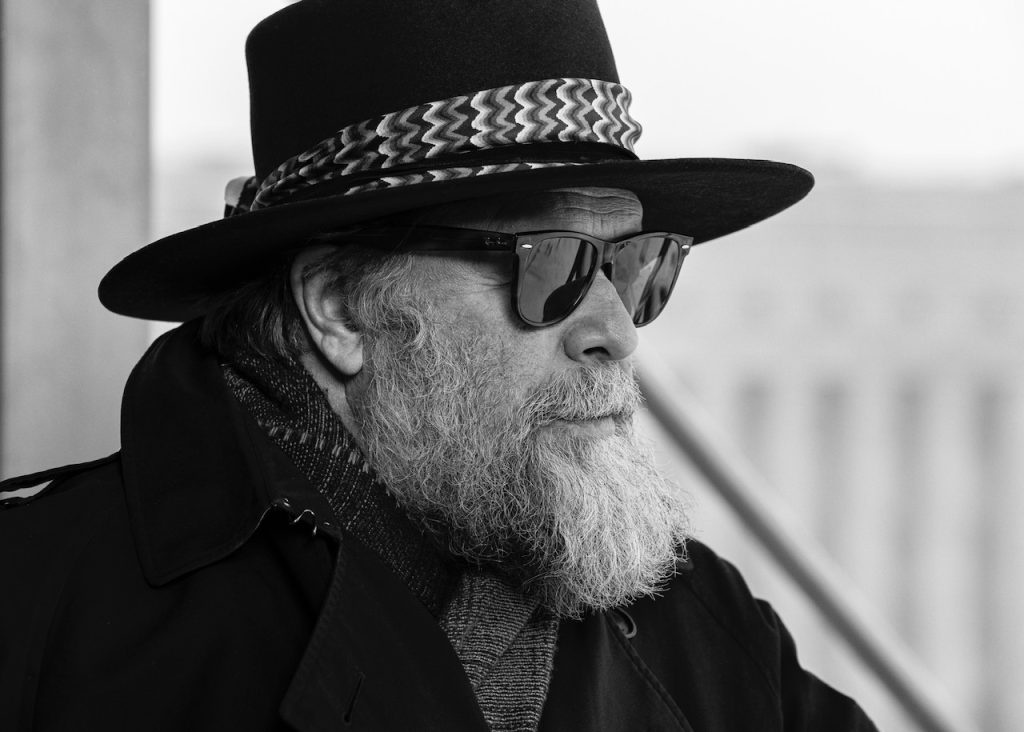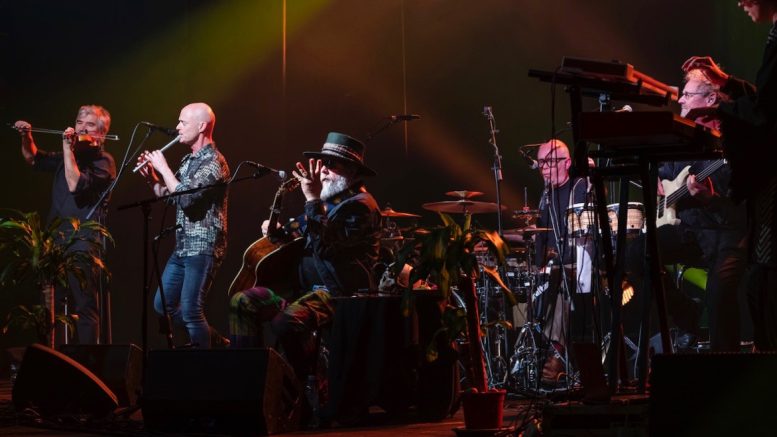By Ken Smith
Russian icon Boris Grebenshchikov’s music, like the man himself, is enigmatic. It is sometimes playful, often poignant, and always poetic; rebellious, yet reverential; and rooted in Russian culture, but embracive of global influences. This multiplicity is likewise reflected in his social media, where he frequently posts live, acoustic versions of songs from his 50-year career and videos displaying penchants for religious imagery, steampunk hats and Baby Yoda.
But on Feb. 28, 2022, just days after the Russian invasion of Ukraine began, Grebenshchikov posted a solemn and plain-spoken video to Instagram, eschewing any hint of ambiguity: “The war between Russia and Ukraine is madness,” he said in his native tongue, “and those who unleashed it are a disgrace to Russia.”
Grebenshchikov—a founding father of Russian rock who is often called BG (sounds like “beh-geh”) by fans—continues to openly and vocally oppose the war and Russian President Vladimir Putin’s regime, on stage and in interviews. He is currently on a “Songs of Peace” acoustic world tour, backed by members of his long-lived band Aquarium and a rotating roster of international musicians collectively dubbed BG+. Grebenshchikov and company are performing at San Francisco’s Palace of the Fine Arts June 14.
Last year, with Dave Stewart (Eurythmics) and Ukranian singer-songwriter Serhii Babkin, he founded the Collaborate For Peace project to raise money for Ukraine. Stevie Nicks joined the trio to record “Face to Face,” a song written from the perspective of a young man going to war. Grebenshchikov’s verse contains the lyrics, “But the one whose heart is dead pulled the trigger/ And instead of Spring came death/ The day will arrive, and the war will become a dream/ And in the sky the light will return/ But it is just where my home once was/ It’s no longer there.”
The backlash to Grebenshchikov’s anti-war stance has been extreme in his homeland. The radio show he hosted every Sunday since 2005, Aerostat, was pulled from the airwaves and his music was banned immediately following the Instagram post. Though he moved from his hometown of Saint Petersburg to London before the war, a Moscow court charged him in May with “discrediting Russian armed forces,” an accusation that has been leveled against others who voice disagreement with Putin’s “special operation” and he could face hefty fines and imprisonment if he returns. In October, he told BBC’s HARDtalk that he regularly receives death threats and will continue his self-imposed exile indefinitely.
Grebenshchikov is one of many musicians, from both sides of the Russian-Ukranian border and ranging from pop stars to classical performers, who have publicly stood up against the conflict. News & Review spoke to Ukrainian avant-folk group DhakaBrakha last September when the band stopped by Laxson Auditorium to raise awareness and funds for their country’s defense.
Grebenshchikov has released dozens of albums with his band Aquarium and as a solo artist, infusing his music with elements of Celtic, Caribbean and other traditions. He released two albums in 2022: Aquarium’s House of All Saints and a collection of acoustic covers called Bardic Songs (the Bard movement began in the Soviet Union in the 1960s and focused on singer-songwriters working outside the Soviet mainstream, mirroring America’s folk revival). Both albums are available on most streaming platforms.

He is also a student of Eastern religion and philosophy and has published several Hindu and Buddhist texts translated to Russian.
Grebenshchikov answered the following questions (in English) via email in late May.
News & Review: How has the tour been going so far? Where are you at right now?
BG: At the moment I’m in London, working on new songs. Tomorrow we fly to the US and resume playing.
Playing music for people is the greatest gift life has given me.
The invasion of Ukraine came around the time of Aquarium’s 50th anniversary. What was planned to observe this, and how did these plans change?
I honestly think that a 50th anniversary for a band is a travesty. Only The Stones are allowed to do this. So, the war interjected on my behalf to stop the unseemly plans, and we started a new band before we struck 50. Same people but a new band.
What is your approach to songwriting? Does it always start with you and an acoustic guitar? Do you hear the orchestration and other instruments in your head by the time you bring it to other musicians, or is that process more collaborative?
It’s always acoustic and me in the beginning. Or piano and me (but to be honest, this happened twice in my life). And then the song gradually builds itself and tells me what it needs.
Some of the songs on the new album express more pessimism than much of your earlier work. “Ворожба” (“Divination” or “Sorcery”), for example, contains lines like “Somehow this rot and scum started up/ There is no more tomorrow.” Would you agree with this evaluation?
All the creation stems from chaos. And chaos is definitely non-optimistic. The first good song I wrote, in ‘76, “On the Other Side of Looking Glass,” already contained enough death and pain to last for 50 years; the rest follow suit. But, you know, they say you can only see stars at daytime from the bottom of a deep well.
Were some songs written after February 2022? Are references to the current conflict intentional, or by chance?
Since February ‘22, I stopped writing, only finished one song, the aforementioned “Ворожба.” But—from my experience—songs do not reference; they predict. Topical songs are cheap.
There is also a lot of light and hope on the album as well. How do you maintain optimism and faith in humanity in the face of horrific situations?
I do not. But being a bit educated in ancient history, I know that things come and go, totally disregarding our expectations. The rest is math.
You also recently released a collection of Bard songs. How would you describe the Bard movement to people from the West who are unfamiliar? How has it influenced your own work?
It was street art, not allowed on radio and TV; chronicles of truth and rare beauty in the land of bare-face lies. From the bards I learned to fuck the rules and follow my own path.
When first touring America in 1989, you famously remarked that most American music is boring. How do you feel about the current state of American music? Any current artists you like?
I was raised on Bob Dylan, The Dead, Creedence, Lou Reed, John Lee Hooker. They were not boring, I assure you. I’m still looking for music of this caliber. From more recent times, I was always enchanted by Tom Waits, The Magnetic Fields, Beck, Eminem—and so on.
You collaborated with Dave Stewart on “Radio Silence” and again for the Stand With Ukraine effort. How do you characterize your working relationship with him, and has he had a role in how you engage audiences in the West?
Dave is my dear dear friend: to be doing something with him makes me happy. I saw him recently for the first time in 25 years and it’s like we continued our conversation where it broke off.
But still I’ve no idea how to engage audiences. I don’t even know if I should.
I’ve noticed you’ve taken a shine to Baby Yoda, including him in graphics, bringing a doll to interviews, and he even gets a mention in the “House of All Saints” title track. What appeals to you about this character? Do you see him as a spiritual ideal of sorts, an enlightened being?
Mando and Baby Yoda are saints of our times. We are pirates under crossbones flag of our music and having BY aboard our ship brings good luck.
How does it feel to be (perhaps permanently) separated from your home, and the culture and people you love?
I would prefer not to be separated—not from my home and friends, nor from people to whom I was singing for half a century. But certainly, it all is happening for a reason. I’m just not aware of this reason. So I plow on and observe the changes.
You’ve expressed that Putin’s war is also a war against the people and culture of Russia. Can you elaborate on this?
It seems to me that the current situation is not quite conducive to any cultural or scientific progress in the country. It’ll be amazing to see where it will lead.
Do you regret not being able to share the music of the world with Russian audiences since your radio show ended?
It was canceled and of course, it’s a pity. But where there is will, there is a way. I’m certain people who want to listen to Aerostat radio shows can find a way to do it. About 100 thousand people do it through the app, and some more on Echo Radio.
What impact do situations like this, and other crackdowns on Western or other cultural influences in Russia since the beginning of the conflict, have on people there now?
We’ll have to wait and see.
You’ve continued to create music and seemingly live by your own terms through massive regime changes and directions in Russia, including through the Cold War. Do you see the current situation in Russia as a turn toward the darker past? How can it be stopped?
It’s all part of a big planetary change.
What can people do to make the world a happier and better place? As artists and as individuals?
Happiness is not outside but inside. And the world is our school, beyond good and bad.
Boris Grebenshchikov will perform in Northern California on June 14, at 8 p.m., at the Palace of Fine Arts in San Francisco. Tickets available here. Grebenshchikov news, music, art and tour dates can be found (in English and Russian) at his official website.


Be the first to comment on "‘Songs of peace’ – revolutionary Russian rocker touts peace on world tour, in spite of consequences in his homeland"